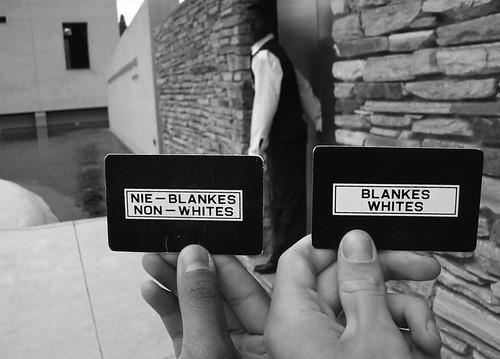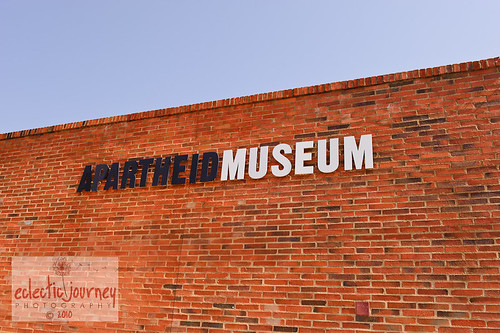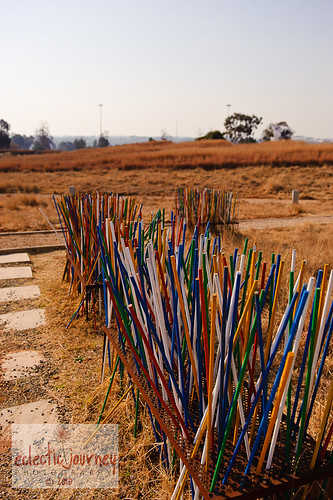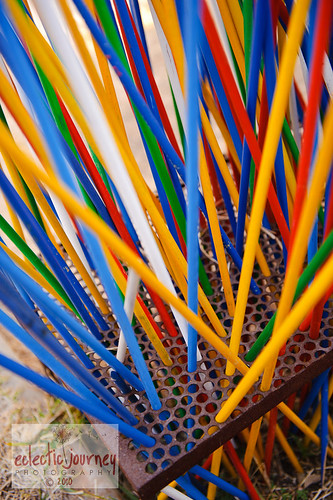Beauty
The Impact of a Mug: A Souvenir Story
Never mind the mugs, this is a story about beauty and justice
Posted January 27, 2011
This is a guest post. The author is Liana Roxanne Clark. She writes a blog called Welcome to the Dollhouse. If you don't yet know her (and chances are you don't), you are in for a wonderful treat. This is an outstanding piece, and I'm delighted to be able to share it with you.
by Liana Roxanne Clark
I really thought that I was just bringing back some souvenir mugs. I had no idea that for my husband, one of the mugs would cause his skin to crawl as much as if he had awoken after having fallen asleep on an anthill. Let me explain.
The Souvenir
Last August, during my trip to Cape Town, I had a wonderful opportunity to visit the Apartheid Museum there. I've already let you know how much South Africa means to me on an almost genetic level. But having the chance to visit the Apartheid Museum was a unique pleasure that I had not experienced on my previous trips to this rich land.
As usual, after going through an experience, such as this visit, that was strong enough to cause a tectonic shift in my consciousness, I sought to find ways to bring the memories home for me to relive as much as I could. Typically, when we think of souvenirs, what generally comes to mind are the silly trinkets that fill every gift shop in every tourist trap around the world: refrigerator magnets, t-shirts, pencil holders and ashtrays emblazoned with names of locales from Buffalo to Bora Bora. But when you remember that the root of the word souvenir is the verb to remember in French you can see how sometimes a souvenir can be more than a bobble-headed hula girl for your dashboard. There are times for all of us when all we want is to look/ hold/breathe in our souvenir so as to take us back to an experience that rocked our world. It was *this* type of souvenir that I wanted to find at the Museum.
I drank in as much as the museum had to offer about South Africa's full history and the birth and death of apartheid. It was heavy and awesome, not in the hipster version of the word, but the true definition of inspiring awe. I knew that I had to have something to take home, some souvenir, that would immediately allow me to relive this experience whenever I needed to.
The gift shop did not have any gifts that fell under the category of "to relive this profound experience buy this." Instead there were posters, t-shirts, bookmarks, and bracelets; just the usual items with no major surprises. Of course, there were no bobble-headed hula girls for sale.
I opted to purchase a bracelet with the words, "respect, equality, freedom" encircling it, in addition to the logo of the Apartheid Museum. I also found a magnetic paper clip topped with a quote from Papa Mandela:
"To be free is not merely to cast off one's chains but to live in a way that respects and enhances the freedom of others"
Boy did I love that! Yet what I found myself drawn to the most, and surprisingly so, were the mugs that had upon them some of the more hateful symbols of that past era. One mug in white read "Whites Only" in stark black text. The other in black with white text read, "Nonwhites Only." These were the apartheid versions of the Jim Crow signs from down South. They also mirrored the startling entry points to the museum itself.
You see, when you purchase your ticket to the museum, on the back of your entry ticket is your ethnic/racial designation for entrance. One entrance reads "Whites Only" and the other "Nonwhites Only." You are asked to enter the entrance that corresponds to your racial designation on your ticket.

Both entrances take you through a brief glimpse into the lives of those classified as white or nonwhite, depending on your door. There are old ID cards with designations listed as white, colored, or black. Also included are personal stories about how the classification was done and what effect it had on people's lives. What was both surprising and not so surprising was that the untrained people doing the classification were not geneticists or ethnologists, but mid-level bureaucrats imbued with the power to determine one's life caste simply by their visual assessment. Even those who were documented as being born to colored parents could be reclassified at the whim of these officials to black or Bantu, the lowest rung on the social ladder.
In my group of visitors to the museum, we were about evenly split between white and nonwhite. I could tell that many of my liberal white colleagues were a little uncomfortable about this in your face racial exercise lacking social nicety or the couching of the racial animus that we are more used to in present-day US society. Being asked to go through these entrances laid bare the dark and ugly that is a society divided by race.
To be clear, these entrances were a mere fraction of all that was contained in the museum. It was perhaps a 25 foot walk before both passages became one common atrium. Yet there was something quite deep and disturbing about having to enter in this manner. You never shook the sense of having been tapped on the shoulder by the ghosts of the most racist recent past. But this entrance also contrasted beautifully with the museum exit and walk through the Mandela "stick" garden. The journey made you infinitely aware of how far this country had come and how much they had triumphed.
In the gift shop I found myself reaching for those mugs as my souvenir, destined to create the combined sensations of repugnance and triumph that were the alpha and omega of my museum experience. This was the souvenir that I needed to take home. That was settled.
Back Home
The trip home left me jet-lagged and grungy. After scoring some make-up sleep, I set about unpacking the gifts and souvenirs from my long trip. I had found a gorgeous original print from a local artist that begged to be framed and hung in our family room. Of course there were also the requisite gifts for the kidlet and AdoringHusband. For the kidlet I had hoped to find a vuvuzela, the noisy symbol of the recently concluded World Cup. Unfortunately the Cape Town airport did not have one vuvuzela to its name. They had been all over Johannesburg, but I thought, why carry that thing through the airport bound to another city in South Africa? It would be simpler to buy it right before I returned to the States. Well that didn't work out so well...or maybe it did, considering how noisy those things are. Instead the kidlet got a drum (slightly more quiet) and some clothes (very quiet). AdoringHusband got a scarf with the colors of the South African flag and a few other goodies as well.
I then unpacked my souvenirs from the Apartheid Museum. I showed the bracelet to AdoringHusband, indicating that we would share its ownership. As is my luck, he then went to put it on, found it was a little too tight, and wasted no time in breaking it in his quest to have it fit. That must've been the shortest souvenir life on the history of the planet. Sigh... I then pulled out the magnetic clip with the Mandela quote and finally the mugs. As I unwrapped them, my white husband looked at me a bit queasily.
"Aren't these cool?" I asked, entranced by them.
"They are...interesting," he responded nonplussed. He is a sweetie in that he always tries not to rain on my parade. His motto is that if I like them, he likes them too. But this time, he was clearly having some trouble.
On the first Sunday morning when I was conscious enough to wake and make the classic banana pancakes that the kidlet loves, I decided to use those two mugs for our coffee. Of course, considering our black/white/swirl family, I naturally handed the Whites Only mug to AdoringHusband. He reached out to take it from me as if there were a snake coiled within about to strike.
"What?" I asked, puzzled.
"I don't like this mug," he answered.
"What's the matter with it?" I asked, totally confused.
"Do you see what it says? I don't like it. I don't like drinking from something that says this."
"But honey," I began attempting to soothe, "it's just a mug. A souvenir."
"I just don't like it," he grumped.
He managed to finish his coffee and I forgot about the whole incident. And honestly I wasn't trying to be insensitive. I just didn't understand what was so problematic about the mug.
Sometime later, I decided again do the coffee thing in our Apartheid Museum mugs. Having blanked on his previous reaction, I ended up repeating the sins of the previous week. This time, his stance was much more vehement.
"I don't like this mug and I'm not going use it. It makes me sick to think about holding it," he protested. Suddenly my memory kicked in.
"How about if I take the Whites Only mug and you take the Nonwhites Only mug?" I offered as a compromise.
"That works," he said with finality. "But I will not drink out of that Whites Only mug."
I was really, really confused. I didn't know what he found so problematic about that mug. In my head it was clearly a symbol of an ugly past that had been defeated, overcome by the will of those in the country and in the world. But for my dear AdoringHusband, something more seem to be afoot. And since I can never leave well enough alone, I had to work to figure out what the issue was.
"Why does this mug irk you so much?" I began.
"Because of what it says! Don't you see it? I don't want anyone thinking I subscribe to that horrible ideology for even a moment." His cheeks flushed with his pique.
"But honey," again I tried to mollify, "this is just a mug in our house. Hello, I'm black and you're white, remember? Do you see the irony of our drinking from mugs symbolizing the ugliness of apartheid while living together as a married couple with our swirl kidlet? It shows why this state sanctioned racism failed! The people chose equality over the ugly. That is the triumph here."
"I see your point," he calmed slightly, "but when I drink from the Whites Only mug, it feels like I've bought in lock, stock and barrel into the ugliness."
"So what does it mean for me to drink from the Nonwhites Only mug?" I posed. "Does this mean that I too have bought into the racist ideology?"
"No, no. Don't be silly," he sputtered. "For you to drink from either mug shows the triumph of the blacks and coloreds."
"Ok, now you've confused me. I could see triumph by my drinking from the Whites Only mug, but not the Nonwhites Only one."
"Yes but the whites were the perpetrators and blacks and colored in South Africa were the..."
"Victims?" I interjected, arching an eyebrow.
"No, not victims," he corrected quickly, knowing that I enjoy being thought of as a victim about as much as I enjoy being thought of as a helpless female. "They were the disenfranchised."
I thanked the Goddess once again that I had married a man of intellect and nuance.
"Either mug you drink from represents triumph over those who sought to rob you based only on the color of your skin," he finished.
"But Mase, don't you see? These were souvenirs from the Apartheid Museum. This museum was built so that all South Africans, hell all people, can celebrate the triumph over state sanctioned racism! What kind of souvenirs would you find in the gift shop of the Holocaust Museum?"
"I dunno. But if you saw me walking down the street wearing a swastika on a t-shirt, you would form a negative opinion about me, wouldn't you?"
"That's not the same thing." I countered. "This is a museum souvenir! Even if I were out with either of these mugs, the fact that they both say Apartheid Museum would give the person reading them pause in the way a shirt with a swastika or iron cross wouldn't."
"Wait a minute. Wait just a minute. 'Apartheid Museum' is actually written on the mugs?"
"Well of course! Look," I said, waggling the Whites Only mug toward him.
He sat back suddenly as if all the wind had just been punched out of him. He then began shaking his head.
"What?" I asked, even more confused.
"I never saw it," he replied softly.
"Never saw what?"
"The words 'Apartheid Museum.' I never even saw them," he finished sadly. "I don't think my eyes ever moved past 'Whites Only.' I saw those words and rejected everything else. Those two words are the antithesis of everything I've ever believed."
I reached for his hand and sat holding it for a while saying nothing. Eventually I broke the silence.
"You see, my love, these souvenirs are indeed a symbol of triumph. Over apartheid, over Jim Crow, over anti-miscegenation laws, over the government sponsored belief that we are not born equal. There's still much work to be done, of that there is no doubt. But now, today, let's just drink our coffee and say amandla."
And we did.









